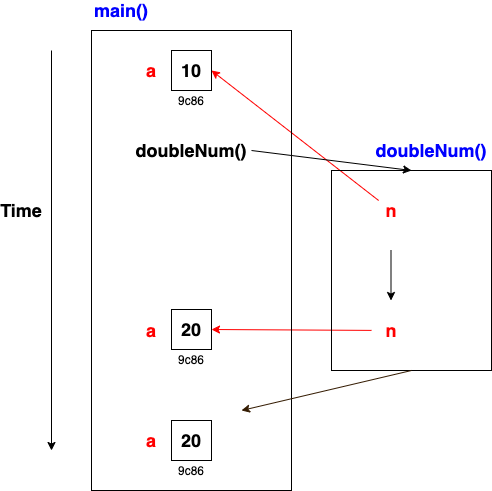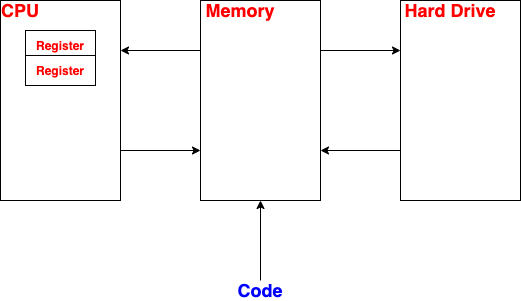Scope
Local Variable in Function
#include <stdio.h>
void doubleNum(int a) // a is a local variable of the function
{
a = 2*a;
printf("a in doubleNum function: %d, %p\n", a, &a);
}
int main()
{
int a = 10;
printf("a in main function: %d, %p\n", a, &a);
doubleNum(a);
printf("a in main function: %d, %p\n", a, &a);
}
Local Variable in Block
#include <stdio.h>
int main()
{
int a = 10;
printf("a in function: %d, %p\n", a, &a);
{
int a = 100; //screen the a in main function
printf("a in block: %d, %p\n", a, &a);
}
printf("a in function: %d, %p\n", a, &a);
}
#include <stdio.h>
int main()
{
int a = 10;
printf("a in function: %d, %p\n", a, &a);
for(int a = 0; a < 5; a++) // screen the a in main function
{
printf("a in block: %d, %p\n", a, &a);
}
printf("a in function: %d, %p\n", a, &a);
}
Global Variable and Local Variable
#include <stdio.h>
int a = 10; // global variable
void display()
{
printf("Global a in display: %d, %p\n", a, &a);
int a = 1000; // screen global a
printf("Local a in display: %d, %p\n", a, &a);
}
int main()
{
printf("Global a in main: %d, %p\n", a, &a);
int a = 100; // screen global a
printf("Local a in main: %d, %p\n", a, &a);
display();
return 0;
}
Storage classes
auto, this is the default storage class for all the variables declared inside a function or a block, auto variables can be only accessed within the block/function they have been declared
register, this storage class declares register variables which have the same functionality as that of the auto variables, but store these variables in the register of the microprocessor if a free register is available
static, keep a local variable in existence during the life-time of the program instead of creating and destroying it each time it comes into and goes out of scope
extern, simply tells us that the variable is defined elsewhere and not within the same block where it is used
#include <stdio.h>
void f()
{
static int c = 0; // static variable
int d = 0; // auto variable
c++;
d++;
printf("c: %d\n", c);
printf("d: %d\n", d);
}
int main()
{
auto int a = 10; // auto
printf("a: %d\n", a); // 10
register int b = 100; // register
printf("b: %d\n", b); // 100
f(); // 1, 1
f(); // 2, 1
}
// main.c
#include <stdio.h>
extern int a;
int main()
{
printf("a: %d\n", a);
}
// util.c
int a = 10;
Reference


